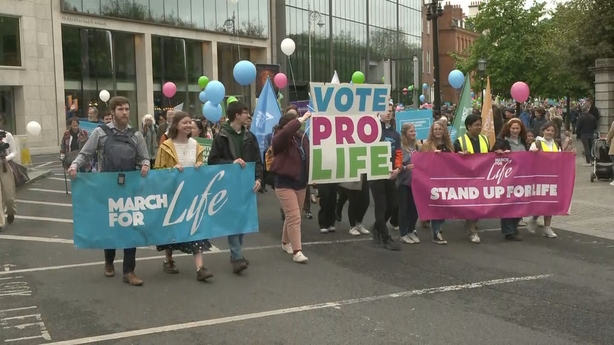Voters have been urged to consider where parties stand on abortion as they go to polling stations this year.
Local and European elections are set to take place in the coming months, while the next general election could be later this year or next spring.
Over 1,000 people gathered in Dublin city centre today for a 'March for Life' rally where speakers called on the attendees to 'think pro-life' before they vote in the upcoming elections.
They called on people to only vote for candidates who are committed to finding ways to reduce what they said was "Ireland’s soaring abortion rate".
Eilís Mulroy of the Pro Life Campaign told the crowds gathered in Molesworth Street that "in the coming weeks the Pro Life Campaign will be publishing a comprehensive voter guide, featuring a list of all election candidates and where they stand on right-to-life issues".
She said it would aid pro-life voters when deciding how to cast their vote in the elections.

Ms Mulroy said that, based on recent answers to parliamentary questions regarding reimbursements made to abortion providers in 2023, it looks like "the number of abortions carried out in that one year period will exceed 10,000, representing a massive increase in abortions year on year since the new law took effect".
Ms Mulroy described the increase in abortions as "devastating".
Independent TD Carol Nolan said that "more and more people are starting to ask questions about what our leaders in Government are presiding over".
She said this was shown "in a truly spectacular way with the results of the recent Family and Care referendums".
The rally took place amid an ongoing political row over stalled recommendations of an independent review of abortion laws.
Barrister Marie O'Shea was commissioned by the Department of Health in 2022 to conduct a review of the legislation that was introduced after Ireland voted to liberalise the abortion regime in the landmark Eighth Amendment referendum of 2018.
In her 2023 review report, Ms O'Shea made a series of recommendations. However, more than a year on, many of the most significant proposals are yet to be implemented.
Among the recommendations proposed by the barrister is the removal of a mandatory three-day waiting period between a woman's initial medical consultation and her being given access to abortion treatment or medication.
The review also recommends the threat of criminal sanction is removed for medics found to have acted outside the provisions of the abortion legislation, and that the HSE is given the ability to ensure the provision of services is not disrupted due to issues around conscientious objections held by healthcare staff.
Speaking at the rally about the need for freedom of conscience protections to be strengthened for healthcare workers who do not wish to facilitate abortions, UK-based Dr Calum Miller said: "Erode conscience, and you remove the healthcare professionals with the most integrity, who are willing to do what is right rather than what is convenient."
Ms O'Shea also urged a review of the legislative definition related to abortion in cases of fatal foetal abnormalities.
Minister for Health Stephen Donnelly continues to consider the review ahead of presenting final proposals to Cabinet.
Taoiseach Simon Harris has insisted that any proposals to change Ireland's abortion laws must be given "careful consideration".
He has said examination of the O'Shea recommendations needs to be treated with the "same sensitivity" as the debate around the Eighth Amendment referendum.
Mr Harris has said he wants to "respect" the diversity of views on the issue and "bring forth consensus".

